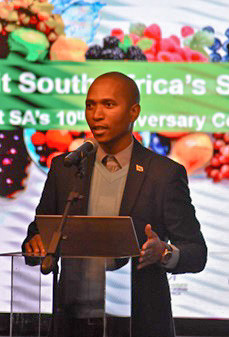 At FruitSA’s tenth birth day celebration hosted in Pretoria, the diplomatic capital of South Africa, a number of speakers reiterated the contribution of fruit exports to South Africa: more than R63 billion (3.2 billion euros) in foreign revenue.
At FruitSA’s tenth birth day celebration hosted in Pretoria, the diplomatic capital of South Africa, a number of speakers reiterated the contribution of fruit exports to South Africa: more than R63 billion (3.2 billion euros) in foreign revenue.
It doesn't go unnoticed by the government, Sifiso Ntombela, special ministerial advisor at the Department of Agriculture, Land Reform and Rural Development (right) assured assembled guests.
But even for an optimist like her, noted FruitSA CEO Fhumulani Ratshitanga, “the road ahead is not going to be an easy ride.”
The fresh produce landscape changes fast and goal posts are changing, making it difficult to keep up echoed by many fruit industries abroad, which is proof that they are more similar than they are different.
Future-proofing includes a propensity for increased collaboration among policy makers but instead, she remarked, actions driven by self-gain were rampant.
“I say: we continue to stick to the basics, driving research and development, producing world class food, strengthening ties with government backed by watertight trade agreement which will give us an edge in market retention and access to targeted export destinations. We’re not just doing this for ourselves but for future prosperity.”
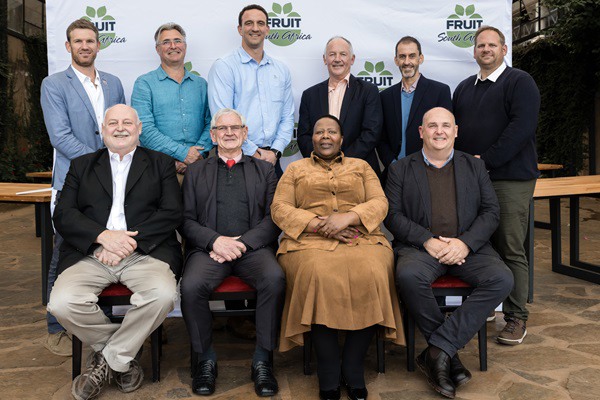
The board of FruitSA, at back: Theo Boshoff of Agbiz, Mark Jensen FPEF chair), AJ Griessel (SATI), Justin Chadwick (CGA), Derek Donkin (Subtrop) and Anton Viljoen (SATI). Front: Anton Rabe (Hortgro), Anton Kruger (FruitSA), Vangile Titi (FruitSA) and Nicholas Dicey (Hortgro) Photo: Frame Quest Media
High tariffs in Asia "a nightmare"
“More than 35% of exports still go to Europe, and when we include the UK we end up with more than 50%,” explained Dr Mono Mashaba, director at the Fresh Produce Exporters’ Forum and the Citrus Growers Development Company.
“Exports to Asia are growing steadily, 16% last year, and the bloc is critically important to the South African fruit industry.
Official trade visits to the Philippines, Vietnam, Japan and South Korea will before the end of the year be rounded out with visits to China and India. Dr Mashaba singled out Agrilink, the trade show in Manila, the Philippines, early in October, as a regular and necessary stop in their calendar of international trade shows.
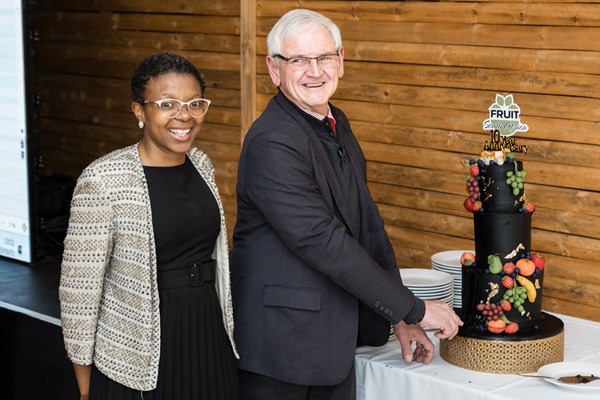
Fhumulani Ratshitanga, FruitSA CEO, cutting the birthday cake with FruitSA's chairperson Anton Kruger (photo: Frame Quest Media)
The slow progress in market negotiations is a concern – as long as fifteen years, with the fruit industry is trying by all means to remove all obstacles and expedite the process.
However, high tariffs on South African fresh produce in Asia is, he noted, “a nightmare”: rates at between 20 to even 40%.
“Many of our competitors in the Southern Hemisphere have free trade agreements with almost all the countries that we’re looking at [in Asia].”
He remarked that the South African government was not at a level where it was ready to engage with Asian countries on free trade agreements.
“On the issue of pest management goal posts are shifting in many of the countries, but we’re working very hard with our experts and our government to address this.”
Black economic transformation FruitSA’s objective is that 30% of the entire value chain should be transformed by 2038.
FruitSA’s objective is that 30% of the entire value chain should be transformed by 2038.
Black growers currently own 8% of fruit orchards and vineyards, producing 7.6% of the volumes often from new orchards so the percentage will probably grow, said Anton Rabe, executive director of Hortgro (umbrella body for deciduous fruit).
In a survey conducted by FruitSA among South African fruit exporting companies, eighteen out of 84 indicated some sort of black ownership.
“What we also see in our middle management, in our export companies, there are lots of stars coming through,” he offered. “But there are no quick fixes. But we know we are busy with the right things.”
He’s quite sure momentum will pick over coming years, as they duplicate successes and safeguard gains despite economic hardships.
Anton Kruger, the chairperson of FruitSA, explained how the organisation facilitates crucial information exchanges regarding vessel arrivals and port efficiencies among role players but, he remarked, "there's no use us doing that if there aren't open ears to hear what we're saying."
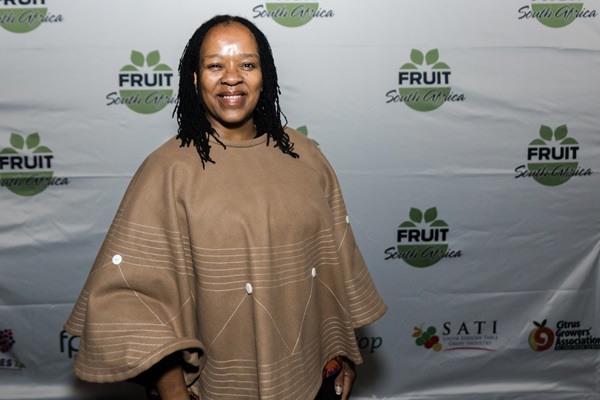 Bongiwe Njobe, former board member of Fruit SA (photo: Frame Quest Media)
Bongiwe Njobe, former board member of Fruit SA (photo: Frame Quest Media)
Citrus from northern areas have already started moving volumes through the port of Maputo in Mozambique, while Orange River grape growers were interested in the possibilities that close by Walvis Bay on the Atlantic coast of Namibia might offer.
Moving cargo away from South African ports do, however, come at a big cost. "The table grape industry lost R1.2 billion during the season because of the port of Cape Town. We have table grape exporters located 100km away from Cape Town who had to truck grapes to Durban, or to Gqeberha and Ngqura at a high cost: around R60,000 each way."
The railway system is barely functioning and the industry sorely feels its absence.
The solution can only be found in a public-private partnership, and FruitSA is a committed participant in the national logistics crisis committees for logistics and electricity within the Presidency.
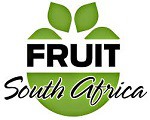 For more information:
For more information:
Fhumulani Ratshitanga
Fruit South Africa
Tel: +27 12 007 1150
Email: admin@fruitsa.co.za
www.fruitsa.co.za
